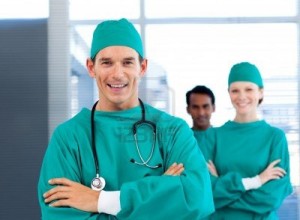(This is Part 3 in a series of blogs I am doing entitled “Why It Doesn’t Make Economic Sense to Run Education like a Business.”)
My brother is a mathematician at another college. As it turns out, students don’t always get great grades in math, especially if the flavor of math happens to be calculus. My brother once received a phone call from a parent who was upset that his son had received a poor grade. At some point in the conversation, the father asked, “Do you realize how much we are paying for this education?”
Now, how was my brother supposed to respond? If the student really is a “customer,” and math is the “product,” I suppose he should have said, “Oh, that’s right. I’m sorry. You have paid full price for your college tuition and that means your son really did get all of those problems correct. I’ll just correct the gradebook right away and I promise it won’t happen again.”

Here’s a great cost-saving idea for medical school! Since students are “customers” and education is a “product,” let’s stop pouring money into medical schools and just sell our degrees in surgery to the highest bidders! Let the market solve the problem!
This, of course, would be an absurd response.
But we are a bit absurd these days. It’s more than a few complaining parents who tend to think that an education is something that can be purchased. We don’t usually state it in these terms, but if you look closely you will see that many of our educational polices are built on assumptions that view education as an economic transaction. In many policies in which money is invested in education, (either through tuition payments or government allocation) it is solely up to the provider to insure that students demonstrate academic mastery. This can be seen in initiatives on higher education from the federal government. Obama’s plan to lower the costs of higher education places almost all responsibility on academic institutions while doing very little to consider the role students play in the educational process. The most famous Republican policy from the past decade – Bush’s “No Child Left Behind” – is guilty of the same problem in the way it emphasizes standardized testing. These policies make sense if education really can be run like businesses, for the economic self-interest in capitalism pushes businesses to deliver better products at cheaper prices.
Education, however, is a different animal.
Now, it is true that some academic systems are better than others. Some teachers are better than others. All educators need to be held accountable to high standards. And somebody has to pay for it.
It is also quite possible that my brother is a hack of a teacher and is failing at his attempts to teach his students calculus. I hesitate to draw that conclusion, however. For one thing, my brother has been able to consistently beat me in one-on-one basketball, tennis, golf, horseshoes, baseball trivia, Rack-O and War ever since he did every one of those things in the summer of 1982 when I was twenty and he was seventeen. So I’m a little afraid that he might beat me up if I tell everyone he is a terrible teacher.
But I also hesitate to draw that conclusion because I know from other sources that he is a very good teacher. I also know that his students do very well at math. And I know that in the class with the aforementioned student, most of the other students were getting good grades and demonstrating that they were learning calculus. Since they all paid tuition and were in the same class, how could it be that they received an inferior product than he did?
The answer: education is not a product that you can buy. This is Case’s Law #1. My brother’s student was not going to master Calculus III simply because his father paid a lot of money for his tuition.
Education cannot be run like a business because purchasing a product demands nothing from the customer except money. Education, however, makes demands on students. And those demands come in many forms.
Education demands that the student master virtues and practices – or in common terminology, study habits. Many students procrastinate, study sloppily, study too little or get distracted when they study. Weekly intoxication hinders the academic performance of many of our college students. However, a person who purchases a Big Mac at McDonald’s owns that hamburger as soon as the clerk slides the tray across the counter. One does not have to read, write, solve problems, or practice extensively to master the ownership of that Big Mac, much to the relief of the millions and millions who have been served.
Other demands are actually beyond the abilities of the student, regardless of his or her study habits. I think it is fair to say that in the field of mathematics, for instance, every person reaches a level beyond which the math is just too difficult to master. Many of us reach our limit with calculus. Some cannot get beyond geometry. But even the most gifted mathematicians reach limits. Arguably, none of the most intelligent mathematicians alive today, including my brother, are as brilliant as Isaac Newton was. Meanwhile, one needs no talents, skills or abilities to purchase a big screen TV. Big screen TVs can even be purchased for two-year old who cannot yet talk, which may also help explain why they will later fail to master calculus.
The demands of life situations beyond the student’s control can also hinder education. Students get sick. Sometimes they have tragedies or conflicts at home that undermine their education. Mental health problems very often first afflict individuals in their early twenties, when they are in college. And yet, people in all of these situations still are able to buy iPhones, shoes and Netflix subscriptions.
I don’t know why the student in my brother’s math class did not receive the grade his father wanted. It might have been poor study habits. He may not have had the same ability as others in his class. It might have been things in life beyond his control. It might have been a combination of these things. But tuition dollars alone were not going to make him solve the calculus problems correctly.
Educational discussions, proposals and policies will fail economically (and academically) if they assume the problems can be fixed simply by sharpening the economic incentives of academic institutions and educators. We also have to consider demands on the students, demands that cannot be gained through an economic transaction.
Yeah, money can’t buy me love. Or knowledge. Or skills. Or understanding. Or wisdom.





